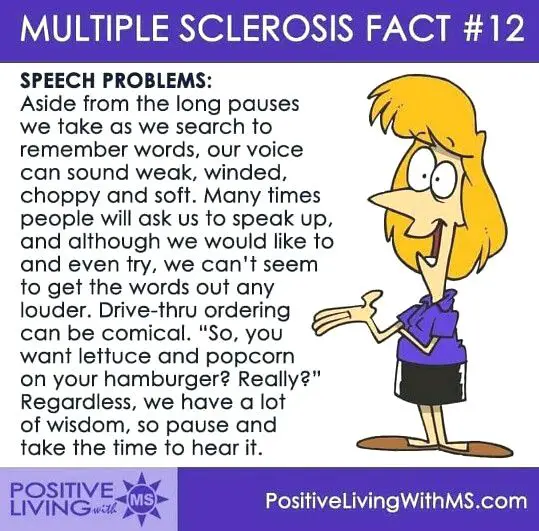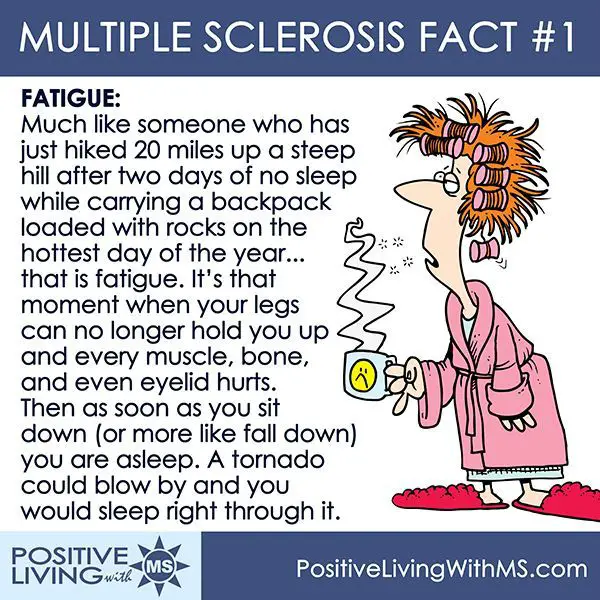Practice Mindful Movement Such As Yoga Or Tai Chi
Forms of exercise that include some form of meditation and mind-body connection, such as tai chi and yoga, may be helpful for MS fatigue, according to research published in BMC Neurology. And another review published in PLoS One in February 2017 found that tai chi may benefit quality of life among people with MS, but more research is needed to confirm this.
Yoga can be beneficial, as it incorporates mindfulness, stretching, and low-impact exercise, says Conway. There havent been a lot of studies about this, but in my personal experience, it can help, he says.
Fatigue A Major Barrier To Recovery After Stroke
Fatigue is closely related to poorer physical recovery after stroke, according to a new study by the Heart and Stroke Foundation Canadian Partnership for Stroke Recovery.
A third of people who have a stroke experience debilitating fatigue, which may be caused by depression, sleep disturbances, lesions in the brain, or other unidentified factors.
Post-stroke fatigue is paralyzing, says Dr. Bradley MacIntosh, lead author and a neuroimaging scientist at Sunnybrook Research Institute. It is characterized by extreme tiredness, weakness, and exhaustion. It is the feeling that even if I could move, it would take too much effort. Sunnybrooks Dr. Walter Swardfager, scientist in the Brain Sciences Program and senior author of the study adds: It is easy to imagine how these symptoms might impact recovery, given the many benefits of being physically active after a stroke.
To complicate things, some symptoms of fatigue overlap with post-stroke depression, making it difficult to disentangle their impacts on different aspects of stroke recovery.
If fatigue is misidentified as depression, some anti-depressants may, in fact, make fatigue worse. There is no proven treatment for fatigue after a stroke, says Dr. Swardfager. We need to identify how fatigue poses a barrier to recovery, and understand the causes of fatigue so that we can treat it specifically.
Overcoming Excessive Sleep After Stroke
Excessive sleeping after stroke is common during the early stages of recovery as the brain works hard to heal itself. However, excessive daytime sleepiness could signify other problems that deserve a conversation with your doctor.
If your daytime sleepiness is caused by depression, sleep apnea, or other problems, treating these conditions can help decrease your sleepiness. Otherwise, certain medications such as modafinil can increase alertness. Your doctor can help you choose the best treatment for you.
We hope this information on excessive daytime sleepiness can help you find ways to boost your energy and continue your recovery from stroke.
Read Also: Mohawk Home Timeless Traditions Anti Fatigue Kitchen Mat
Speech And Swallowing Changes With Ms
Speech and swallowing changes can occur due to affected nerves being damaged. This may present as changes to the voice tone and quality, or coughing when eating.
These symptoms should be reported to your MS healthcare team for assistance from a speech therapist, who can advise on appropriate management.
Time And Timing Differentiate Two Types Of Ms

There are two main types of MS:
- Relapsing-remitting MS is exactly what it sounds like: New neurological symptoms develop caused by inflammatory attacks on myelin, called a relapse, followed by periods of recovery where the symptoms may improve, remain but not worsen, or go away. This period is called remission.
Relapsing-remitting MS is the most common form of the disease. According to the National Multiple Sclerosis Society, approximately 85 percent of people with MS are first diagnosed with relapsing-remitting MS. Most diagnosed with this type of MS are generally in their 20s and 30s.
- Primary-progressive MS occurs when there’s no improvement in symptoms from the onset of disease. “There may be subtle improvements, but overall, the trajectory is continued worsening over a period of at least a year,” Shoemaker explains.
This form of MS can be more difficult to diagnose since people with the primary-progressive type tend to have less brain scarring, more spinal cord scarring and less inflammation than those with relapsing-remitting MS. They also have more difficulty with mobility and everyday activities, and onset usually occurs in the 40s or 50s.
Whereas 80 to 85 percent of cases of MS are relapsing, primary progressive MS is about 15 percent of the cases at diagnosis, and a 50-50 split between men and women.
Read Also: Can Diabetes Cause Extreme Fatigue
Who Is More Likely To Have Post
There have been several studies that attempt to determine who is more likely to experience fatigue after a stroke, but this research is inconclusive and requires more testing. One study shows that women, older people, and those who suffered from fatigue before their stroke are most likely to experience it. However, other studies show that younger people and those
who were in shape before the stroke took place can also experience stroke-induced chronic fatigue. The bottom line is that this is a very common post-stroke condition that almost every type of survivor will battle with.
This type of tiredness can range from mild to severe, but it does not depend on the severity of the stroke that is, someone who suffered a severe and debilitating stroke can have the same or an even lesser amount of fatigue than someone who suffered a mild stroke.
It all depends on your body and your healing process. Fatigue is common to see after different types of stroke, including hemorrhagic and ischemic. However, it is more likely to experience fatigue after stroke than a Transient Ischemic Attack .
Donât Miss: Difference Between Chronic Fatigue And Depression
Leaving The Hospital After A Stroke
Your care team will formulate a discharge plan that will depend on your level of functional impairment. After the hospital stay, you might continue your rehabilitation:
- In an inpatient rehabilitation unit or independent rehabilitation facility, if you can benefit from being monitored by a physician and can tolerate three hours of therapy per day
- At a subacute rehabilitation facility, if you require a slower course of rehabilitation with one to two hours of therapy daily
- At home with visits to an outpatient rehabilitation clinic as needed
You dont have to be at 100% health to return home after a stroke, says Pruski. If you can perform most of your regular daily activities in your home environment and/or you have family support to assist with these activities, you can go home.
Read Also: Most Common Causes Of Extreme Fatigue
Work Closely With Your Ms Healthcare Providers
Make and keep regular appointments with your doctor to assess whether your disease is under the best control possible and youre receiving optimal MS treatment.
In many cases, when MS is well-controlled, it can help in terms of fatigue levels, says Devon Conway, MD, a neurologist at Cleveland Clinic’s Mellen Center for Multiple Sclerosis Treatment and Research in Ohio.
How Is Fatigue Related To Multiple Sclerosis
Fatigue is the most common symptom of multiple sclerosis . It occurs in 75 percent to 95 percent of patients with MS. Fatigue can occur at all stages of the disease. The symptom is not related to the severity or to the duration of MS. At times, fatigue interferes with function and is an important symptom to manage. There are a variety of ways to combat fatigue in MS.
Recommended Reading: Causes Of Muscle Weakness And Fatigue
Factors That Contribute To Your Fatigue
The fatigue thats unique to MS is called lassitude.
80 percent of people with MS experience this overpowering feeling of tiredness in body and mind.
We dont know the exact cause of lassitude, but we have identified many factors that can add to your feeling of fatigue.
- Insufficient sleep, which can be related to other MS symptoms like bladder urgency, muscle spasms, or pain. You might also be getting too much screen time before bed, or facing an underlying sleep problem like sleep apnea or restless leg syndrome.
- Depression or anxiety, which are common in people with MS. These mental health challenges can be draining for anyone, but they may lead to a vicious cycle for someone with MS. Your depression leads to feelings of fatigue, which amplifies your feelings of depression, and so on.
- Muscle stiffness or weakness, which requires you to use extra energy to move around.
- Certain medications taken for MS or other conditions
- Heat exposure, such as sitting outside on a warm day.
Once youve begun to manage all the issues that contribute to your tiredness, you can tackle MS fatigue.
With the help of your healthcare team, you can identify which factors contribute to your fatigue, and what tools and strategies can be of aid. You can also use the 4 Ps to make daily activities easier and less draining. Well explore both approaches below.
What Causes Ms Fatigue
“There are many reasons someone with MS experiences fatigue, Dr. Cohen says. Some are directly related to MS, and some are not.”
Some of the types of fatigue that may affect people with MS are:
- Indirect Fatigue Stress, trouble sleeping due to muscle spasms, side effects from medication, and depression that may go along with a chronic illness like MS can all cause fatigue. “Doctors should also rule out unrelated causes of fatigue, such as anemia or thyroid disease,” Cohen says.
- Neurologic Fatigue “MS symptoms, like tremors, muscle weakness, and muscle spasms, use up a lot of energy and can lead to fatigue, Cohen says. Damage that has been sustained over time along nerve pathways can be aggravated by stress, activity, fever, and heat exposure. All of these factors contribute to MS fatigue.”
- Autoimmune Fatigue “Persistent tiredness, or lassitude, is common in many autoimmune diseases and is probably the most common type of MS fatigue,” Cohen says. “It is very similar to the type of fatigue experienced in chronic fatigue syndrome.”
RELATED: The Many Varieties of MS Fatigue
Recommended Reading: Chronic Fatigue Syndrome Clinical Trials
When To Call Your Doctor
Inform your healthcare provider as soon as you can if you experience the following symptoms:
- Extreme fatigue
- Inability to maintain balance
Lexapro induced side effects usually begin to subside within 2 to 3 weeks of treatment, but some serious side effects persist. In such cases, it is very important to seek medical help.
Why Does Lexapro Cause Fatigue

Lexapro, brand name for escitalopram, belongs to the class of selective serotonin reuptake inhibitors . It inhibits the reuptake of serotonin from the synaptic cleft and increases its availability in your brain.
Serotonin is a neurotransmitter released by our brain which is responsible for modulating mood, cognition, reward, learning, memory, and various other psychological processes.
Now, a drug, once inside your body, does not only act on a single kind of receptors. It acts on other mediators as well, which is the root cause of producing unwanted side effects.
Antidepressants often stimulate other receptors and mediators, including histamine and acetylcholine, which sometimes lead to unpleasant side effects such as dry mouth, blurry vision, weight gain, and tiredness.
Recommended Reading: Itchy Skin Sore Joints Fatigue
How Is Ms Fatigue Different To Ordinary Fatigue
MS fatigue is more than the tiredness that everybody feels after exertion or missing a good nights sleep. This type of tiredness can still affect you, but MS fatigue goes beyond that.
MS fatigue can be physical and mental it saps energy in an instant and can stop you from completing tasks. MS fatigue can be very debilitating and, unlike ordinary fatigue, it can take a long time to recover from.
MS fatigue is often overwhelming. It can happen at any time without warning or without any apparent reason. Some people say they experience MS fatigue after gentle activities such as writing or reading and they immediately need to rest.
Others say that MS fatigue happens after physical exertion, such as taking the dog for a walk or doing the shopping. For others, MS fatigue can happen after cognitive exertion such as working on the computer and completing mentally-demanding tasks. You may also experience MS fatigue when you wake up, in some cases every day, even after a good nights sleep.
Medications Used To Treat Ms
Medications used for the treatment of fatigue can be helpful but are usually not the magic answer to curing fatigue.
Neurologists sometimes prescribe drugs such as the following to MS patients who need to manage fatigue:
Talk to your healthcare provider about whether one of these medications would be useful for you. Its also important to understand that there are different strategies for taking these medications. Its not an all or nothing deal.
For instance, a person with MS may only take their Provigil if they know they are going to have a long, grueling day. Another person may rely on daily Ritalin to manage fatigue.
These medications also have side effects, such as cardiovascular ones, which may not be safe for you.
Also Check: Body Aches Chills Headache Fatigue
Recommended Reading: How To Deal With Pms Fatigue
Expending All Our Energy
A common meme on the internet proclaims that people with multiple sclerosis expend 5 times as much energy as a normal person. While I havent seen a reference to any science behind that, its still a great way of explaining what fatigue feels like to us. It takes so much for us to do something that others might take for granted. If you have or know someone with MS, then youve no doubt heard about the Spoon Theory, another great description of what its like to live with MS that speaks specifically about fatigue.
What Was The Research About
Multiple sclerosis, or MS, is an illness that affects the central nervous system. Fatigue is a common and disabling symptom of MS.
In this study, the research team wanted to learn how well three commonly used medicines work to help patients with MS feel less fatigued and improve quality of life. The medicines were amantadine, methylphenidate, and modafinil. The team compared these medicines with a placebo. A placebo is a pill with no active ingredients. Using a placebo helps researchers learn if results are due to a medicine or chance.
Patients took each of the medicines and the placebo in a specific order over seven to eight months.
The research team also looked at whether patients took the medicines as prescribed and if they had adverse events. An adverse event is when a medicine causes harm an example is an allergic reaction.
Don’t Miss: Cute Anti Fatigue Kitchen Mats
Experiences Stroke Survivors Make
Stroke survivors are likely to experience some type of physical or mental disability after the incident, due to brain damage. This can make daily activities difficult and decrease the quality of life. As a result, you may feel low in energy due to these disabilities for example, walking and talking may take more energy than they did before the stroke, quickly leading to fatigue. Emotional issues such as depression and anxiety can also contribute to fatigue. There is an increased chance of depression and anxiety in stroke survivors, which has been shown to contribute to fatigue.
Avoid Sedentary Lifestyle And Stay Active
Sedentary lifestyle can surely contribute to your fatigue and staying active is the best way to fight against it. Make sure you workout at least 3 to 4 times a week. Exercise releases happy chemicals in your brain. It not only makes you feel good, but also spikes your energy levels.
Morning workout is considered most efficient in increasing your energy levels and mental alertness throughout the day. Go for a walk or do 10 minutes of high intensity interval training .
It not only helps you to overcome fatigue caused by lexapro, but it also helps you counteract other side effects that you might have. Some of the best exercises to enhance your physical and mental energy levels include:
- Resistance strength training
You May Like: Can Seasonal Allergies Cause Fatigue
Can Multiple Sclerosis Go Away On Its Own
Multiple Sclerosis or MS is disorder of Central nervous system which affects the brain, spinal cord and the optic nerve. Most of the people who are diagnosed with MS are initially diagnosed with remitting and relapsing MS which means the symptoms are not much severe and fade away with time. But in some cases the symptoms are serious and need to be treated carefully. When the old symptoms reappear, they are not very severe and do not require treatment.
Limit Alcohol And Caffeine

Caffeine can affect your sleep by keeping you awake for a longer period of time and can compromise your alertness the next day. The Food and Drug Authority recommends no more than 400 milligrams per day.
In addition, caffeines half-life can range from 2-12 hours, so try to avoid drinking coffee or any other caffeinated beverage within six hours of bedtime.
Also Check: Illnesses That Cause Extreme Fatigue
Axonal Loss And Altered Cerebral Activation
As conventional measures of T2 lesion volume and atrophy have fallen short in providing a basis for fatigue in MS,20 many investigators have relied on non-conventional neuroimaging techniques to shed further insight. The demonstration on positron emission tomography of decreased regional glucose metabolism in the frontal cortex and basal ganglia of fatigued MS patients has suggested that neuronal dysfunction in these regions may play a role.21 Magnetic resonance spectroscopy studies have shown significant reductions in N-acetylaspartate/creatine ratios in multiple brain regions among fatigued MS patients in comparison to non-fatigued MS patients, suggesting axonal loss as a contributing factor.22,23 MS-related fatigue also may arise at least in part from compensatory reorganization and increased brain recruitment, as functional MRI studies that have demonstrated increased volumes and patterns of activation in the cingulate gyri and left primary sensory cortex in fatigued MS patients compared to non-fatigued patients.24
Dont Miss: How To Deal With Fibromyalgia Fatigue